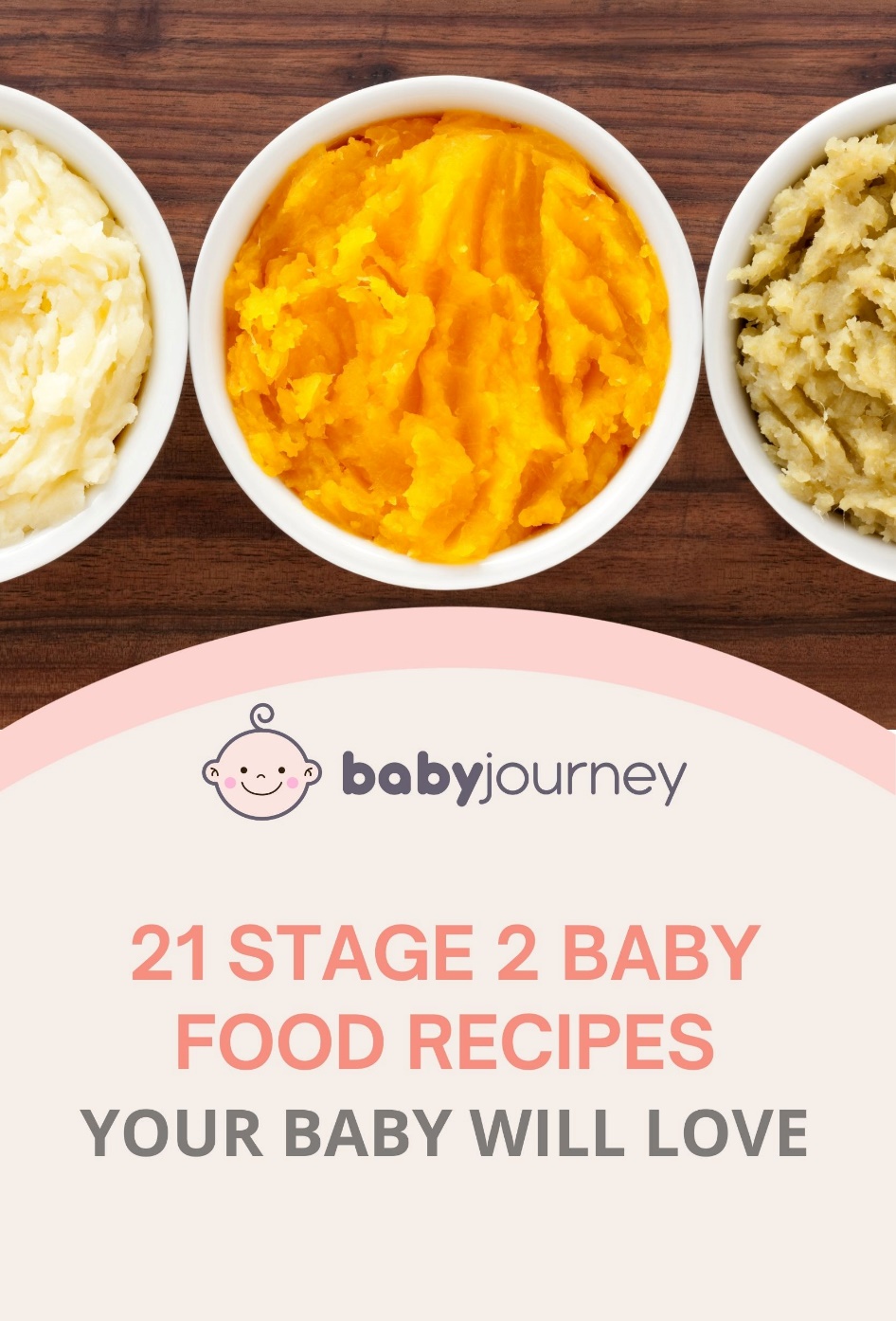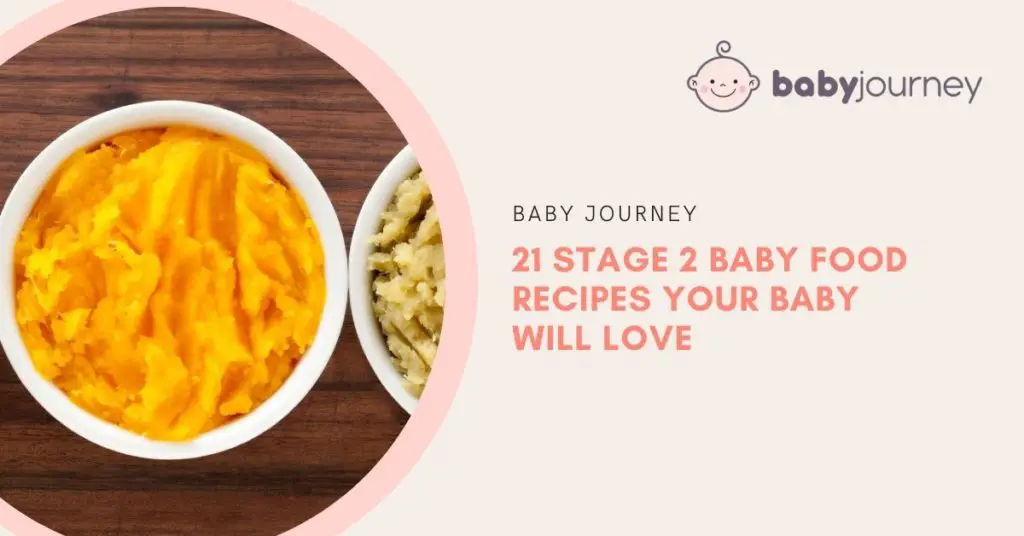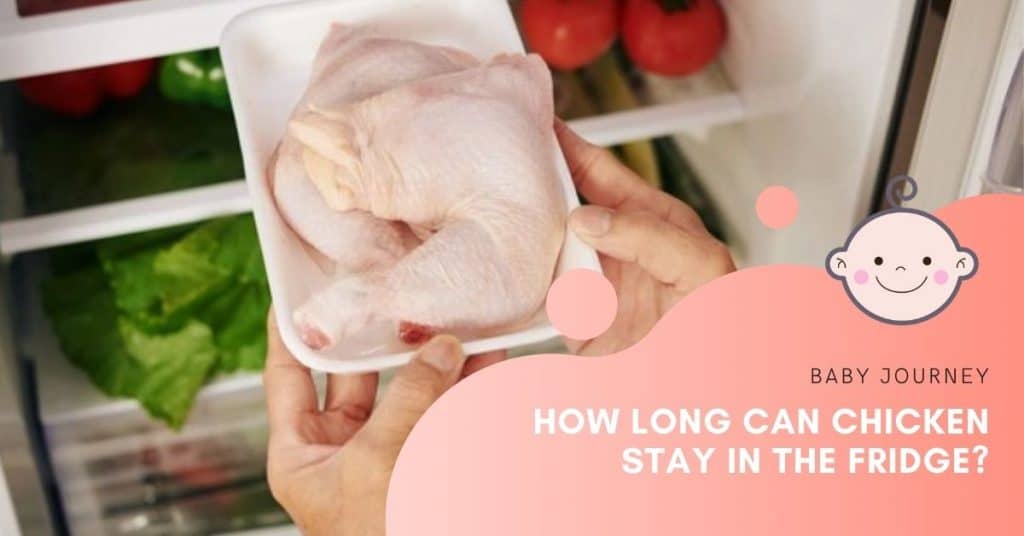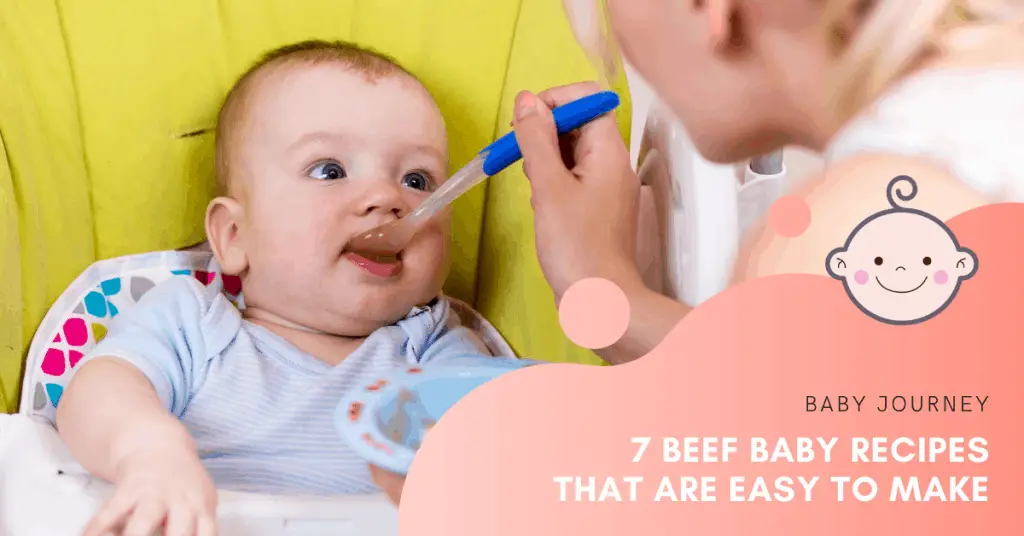When my daughter passed the milestone of six months, I had so much fun exploring different baby food combos and watching her reactions as she curiously tried new flavors.
In this post, I’ll share my favorite stage 2 baby food recipes with you so your baby and you can get the most out of this amazing experience!
However, before I move on to the stage 2 foods for babies, let’s discuss more on the appropriate ingredients, preparation steps, and other aspects – so you can enjoy cooking for your little angel!
- What is Stage 2 Baby Food?
- When to Start Stage 2 Baby Food?
- How to Make 2nd Stage Baby Food?
- Stage 2 Baby Food Ingredients to Use
- 21 Stage 2 Baby Food Recipes
- Cereal/ Purees with Whole Grain Recipes:
- #1 Strawberry, Sweet Potato & Farro for Fiber-Rich Meal
- #2 Colorful Millet & Carrot Puree Enriched with Superfood
- #3 Fulling Banana-Based Cereal Meal Babies Love
- #4 Sweet Pear Blends Perfectly with Quinoa and Chicken
- #5 Pastina Makes an Excellent First Pasta
- #6 30 Minute Cooking for the Creamiest Cereal Meal
- #7 Wheat Porridge Against Constipation
- Purees with Proteins
- #1 The Pumpkin & Chicken for a Strong Baby
- #2 Mix White Fish to Encourage Healthy Eyesight
- #3 Zinc and Folate Rich Chickpeas Pair Well with Veggies
- #4 Whole Milk Yogurt, Oats & Blueberries for Healthy Growth
- #5 Humble Lentils have Excellent Health Benefits
- #6 Avocado and Banana Combo for a Wholesome Meal
- #7 Salmon is the Best Fish for Babies
- Purees with Herbs and Spices
- #1 Add Fennel to Aid Stomach Cramps
- #2 Pair Spicy Ginger with Sweet Potato and Mango for a Balanced Taste
- #3 Orange is for Curry and Carrots
- #4 Peach and Vanilla Beans for a Sweet Lunch
- #5 Mint and Peas for Tummy Relief
- #6 Thyme Gives Unique Flavor to Roasted Veggies
- #7 When your Blender Breaks Roast Pears with Rosemary
- FAQ’s
- Conclusion
What is Stage 2 Baby Food?
Stage 2 foods for baby include thicker baby puree textures made from two or more ingredients. At that point, the list of ingredients that are safe for the babies expands as compared to stage 1. [1]
When to Start Stage 2 Baby Food?
Stage 2 baby food age covers the age of six to nine months. However, some babies become ready sooner than others. If the baby is able to swallow food without tongue thrusting it out, it is a safe sign that you can start with some baby food recipes stage 2.
How to Make 2nd Stage Baby Food?
Here are some general guidelines on the cooking and storing instructions for stage 2 homemade baby foods that you can try!
Preparation
Combinations of foods that commonly include vegetables, fruits, meat, fish or legumes is strained or mashed. The texture should be paste-like, thicker than the watery purees you served in stage 1. [2]
Cooking
You can:
- Boil – vegetables and meat
- Bake – vegetables, fruits and fish
- Steam – vegetables and fruits
Blending
Use a blender, food processor, stick mixer or immersion blender to make a thick paste from the previously prepared foods or fresh ingredients. Pro tip: always cross check if the baby food is safe for use in stage 2 and avoid blending baby foods that cause gas!
Storing
You can store baby food into BPA-free sealed containers in the fridge for 48 hours. However, keep in mind to put the baby food in the fridge within two hours after cooking as bacteria develop at room temperature after that time.
You can freeze baby food using freezer storage bags but you’ll have to use them within three months, and remember to never refreeze the leftovers.
Related: How Long is Frozen Baby Food Good For?
Stage 2 Baby Food Ingredients to Use
The primary difference between stage 1 and 2 baby food is the food combinations that you can use. While in the first stage you serve only one ingredient at a time, during stage two you can mix two or three ingredients to create yummy flavor combinations.
So, the stage 2 baby food list includes not only fruits and veggies, like stage 1, but also legumes, meat and fish. Also, you can try introducing spices at this stage.
It should be noted that if you lack fresh ingredients, it is safe to use frozen fruits or vegetables in your stage 2 baby purees.
Here is a list of ten ingredients you can mix and match to make delicious stage 2 baby food meals!
- Sweet potato
- Banana
- Oats
- Pumpkin
- Pea
- Mango
- Kale
- Chicken
- Whitefish
- Spices including thyme, cinnamon, curry, fennel, mint and more!
21 Stage 2 Baby Food Recipes
Here are the best baby food combinations packed with all the necessary ingredients for your growing baby!
Cereal/ Purees with Whole Grain Recipes:
#1 Strawberry, Sweet Potato & Farro for Fiber-Rich Meal
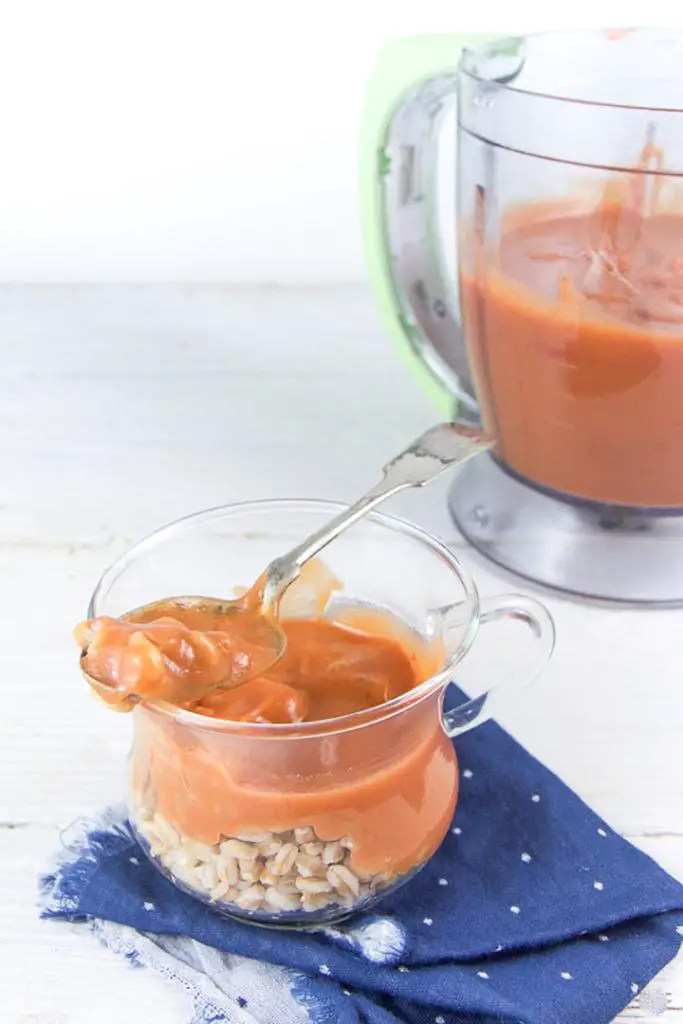
Ingredients:
- 1 cup cooked and presoaked farro
- 2 cups fresh strawberries
- 2 cups sweet potato
- ¼ tablespoon of cinnamon (optional)
Start by blending a mixture of sweet potato and strawberries. Add cooked farro and stir the puree to mix everything together. To save time, you can process all three ingredients at the same time.
The result is a sweet and savory puree. For a tangy aroma, it is optional for you to add a bit of cinnamon.
#2 Colorful Millet & Carrot Puree Enriched with Superfood
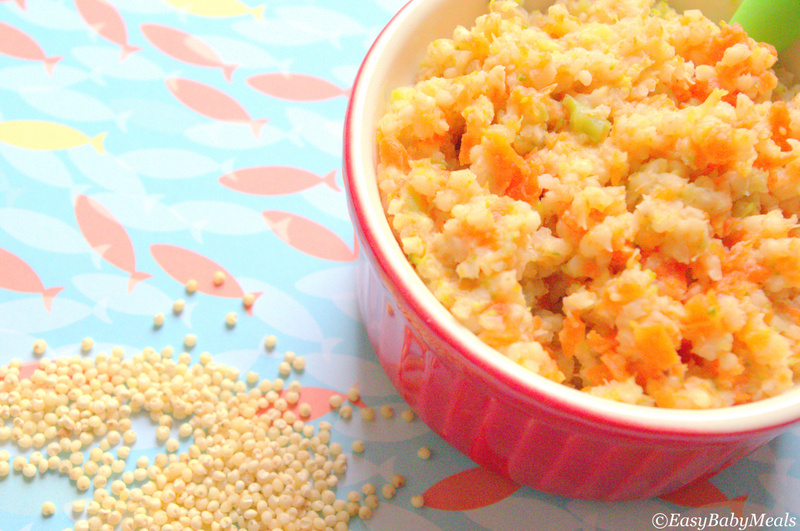
Ingredients:
- 2 tablespoons millet
- 1/2 cup chopped broccoli
- 1/2 chopped carrot
The recipe with millet, broccoli and carrot is one of the easiest homemade baby food recipes stage 2. Simply cook all three ingredients in boiling water until everything is mushy. Drain the ingredients and process in a blender!
#3 Fulling Banana-Based Cereal Meal Babies Love
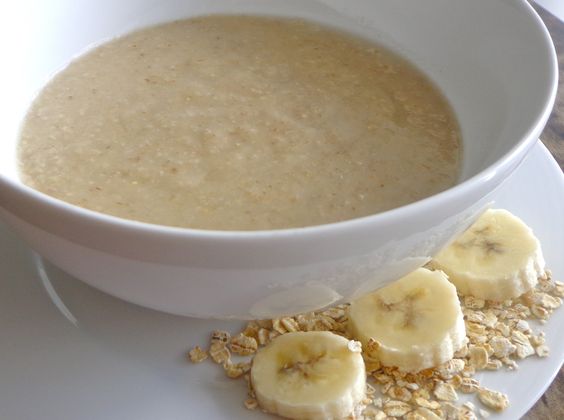
Ingredients:
- 1/2 cup oats
- 1/2 banana
- 1 tablespoon raisins
Mix cooked oats with a banana in a food processor. For babies older than 8 months that can chew food, you can sprinkle it with raisins. For younger babies, include a tablespoon of raisins with oats and bananas and process them together.
#4 Sweet Pear Blends Perfectly with Quinoa and Chicken
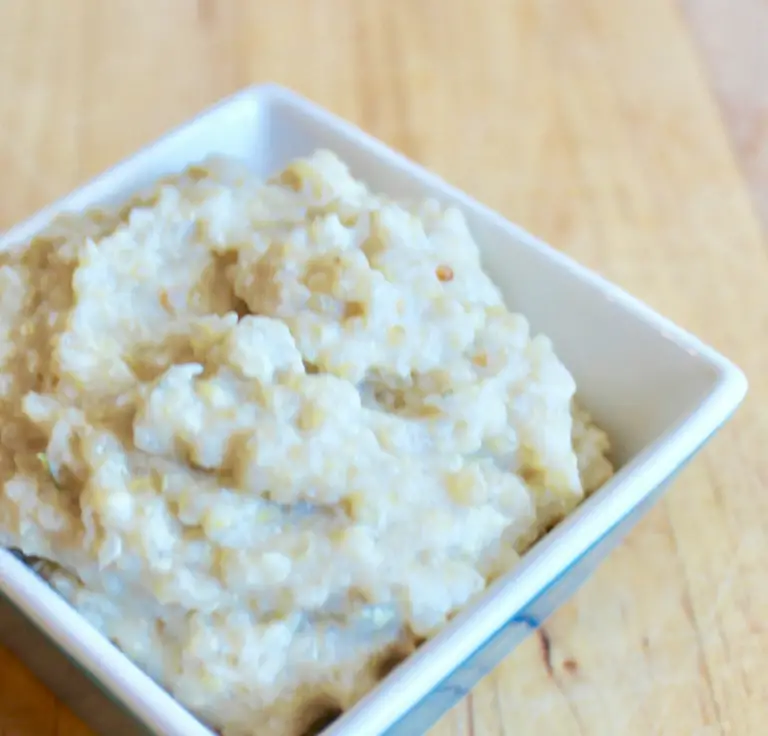
Ingredients:
- 1/2 cup quinoa
- 1/2 cup pear (sliced and without the skin)
- 3 tenderloins
- 1/2 teaspoon thyme (optional)
Quinoa is one of many options of superfoods for babies known for its excellent health benefits. Cook everything together in a pan until quinoa is cooked and the chicken is tender. You can add a pinch of thyme for better taste. Process in the blender.
#5 Pastina Makes an Excellent First Pasta
Learn how to make a banana paste you can use as a base for various baby food mixes.
Ingredients:
- ½ banana
- 1 cup of pastina
Pastina is a great pasta to start with because it is mushy and doesn’t come with a risk of choking.
Here is one of the quickest, 2-ingredients healthy lunch ideas for toddlers and babies: Mash banana with a spoon and mix it with cooked pastina to make a thick paste.
#6 30 Minute Cooking for the Creamiest Cereal Meal
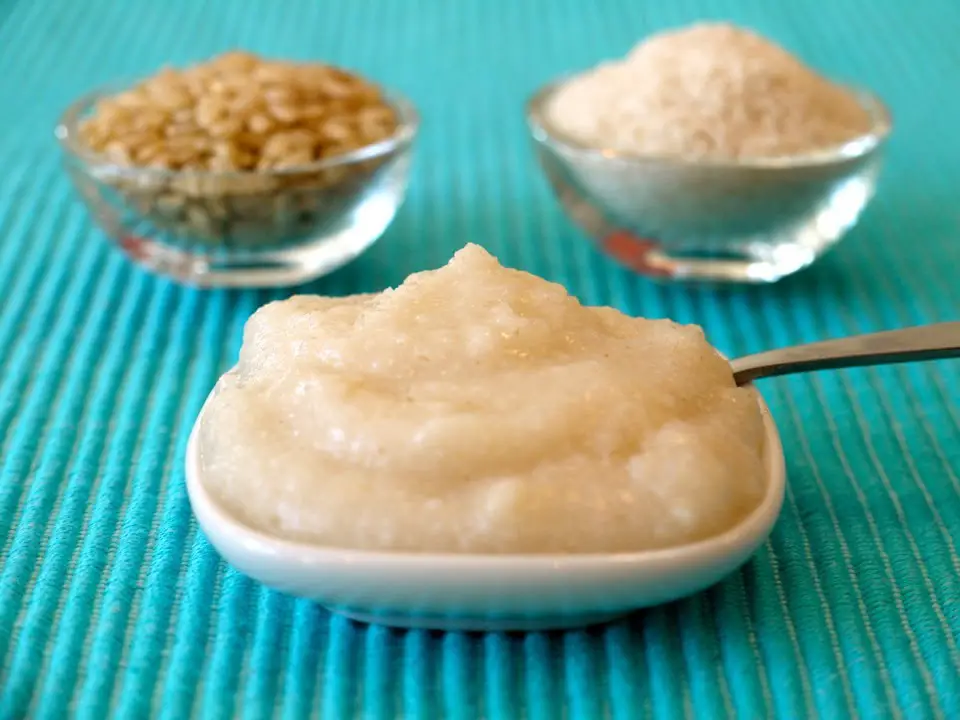
Source: Weelicious.com
Ingredients:
- 1/4 cup brown rice
- 1 cup almond milk (water for younger babies)
- 1 tablespoon of raisin
- ¼ tablespoon cinnamon (optional)
Cook rice with raisins in almond milk until all the liquids have been absorbed. Put the pot with rice over a broiler, and leave it for 30 minutes on low heat. Cinnamon is optional!
#7 Wheat Porridge Against Constipation
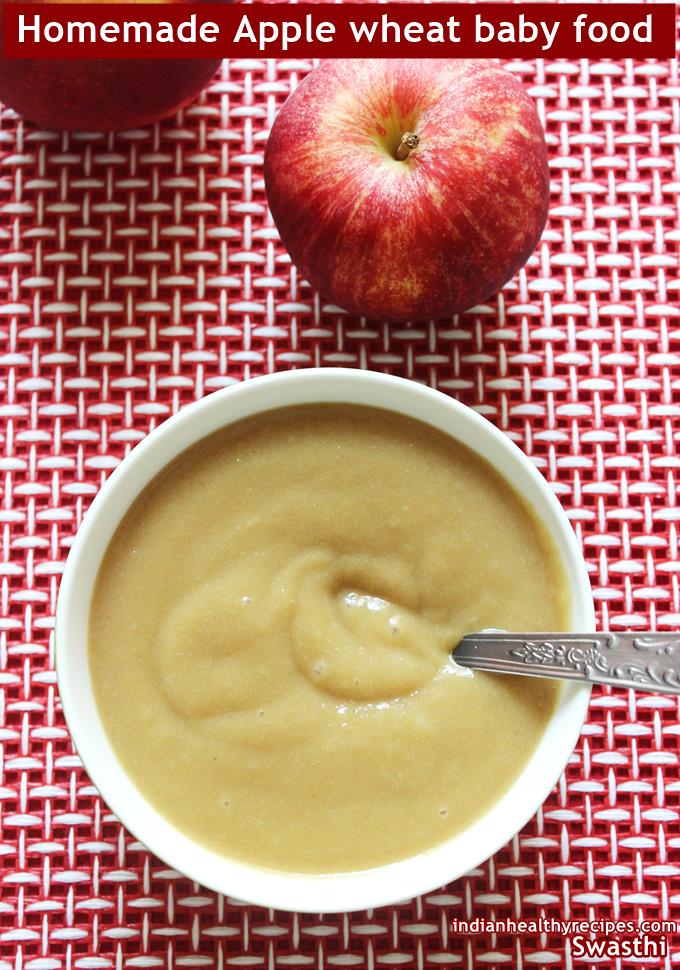
Source: Indianhealthyrecipes.com
Ingredients:
- 3 tablespoons wheat flour
- 1 cup water
- 1/2 banana
- 1/8 teaspoon ghee
Ghee is an excellent butter replacement in baby puree combinations that add a creamy texture. For this baby food recipe, mix wheat flour and water without lumps, and cook on low to medium heat until the consistency is thick.
Lower the heat and mix in ghee. Add to the mashed banana once the wheat porridge is cooled down. Serve it to help the baby overcome constipation!
Purees with Proteins
#1 The Pumpkin & Chicken for a Strong Baby
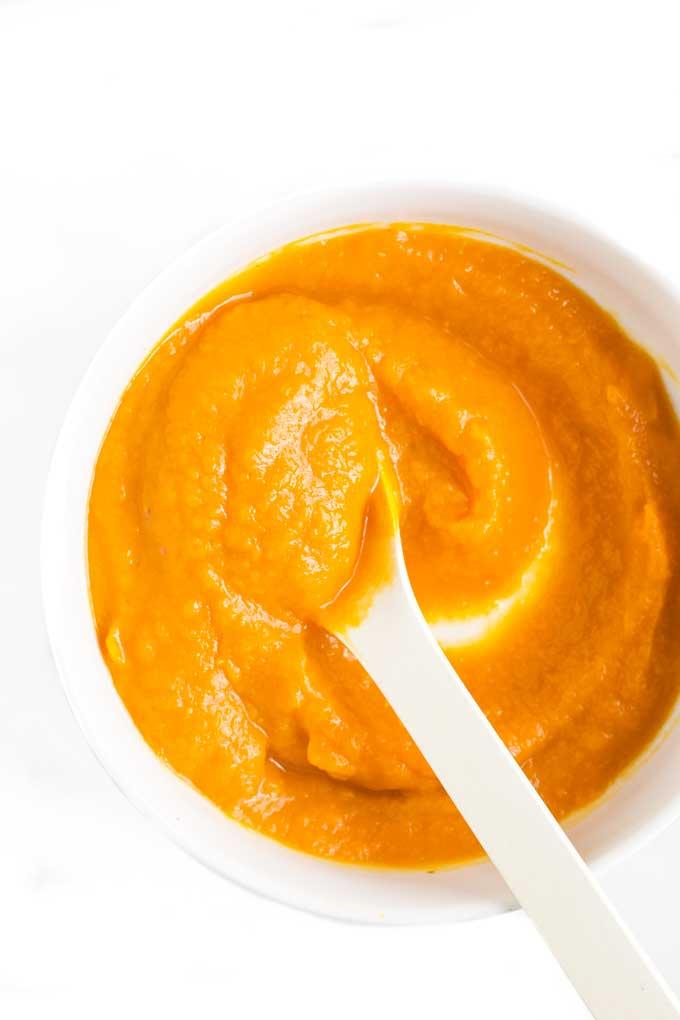
Source: Healthylittlefoodies.com
Ingredients:
- 1 cup boiled and blended chicken (skinless and boneless)
- 2 cups pumpkin
Bake the pumpkin in the oven for one hour at 175 degrees Fahrenheit. Scoop the pumpkin flesh with a spoon, and add to chicken you have previously boiled and blended. Mix the two together with a spoon.
#2 Mix White Fish to Encourage Healthy Eyesight
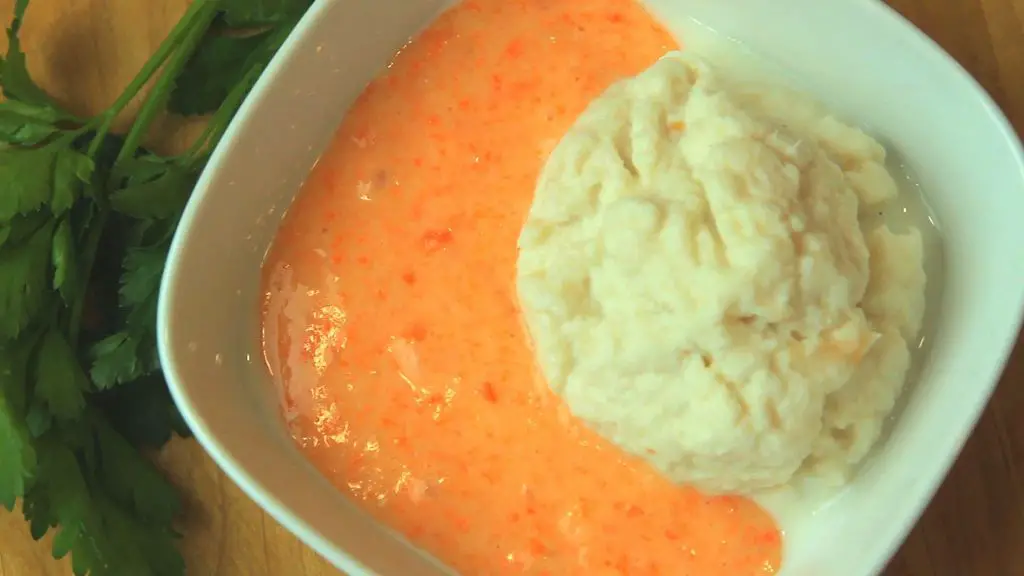
Ingredients:
- 6-ounce fish fillet
- 1 cup chopped potato
- 1 cup chopped pumpkin
- 1/2 cup water
Protein-rich baby food recipes 6-8 months include white fish, which you can add to vegetable purees. Steam fish with sliced potato and pumpkin in a pan, until everything is soft and mushy.
Put everything into a blender, add a little bit of water and proceed. Continue to blend until you get a soft texture. Add as much water as needed to get a consistent puree structure!
#3 Zinc and Folate Rich Chickpeas Pair Well with Veggies
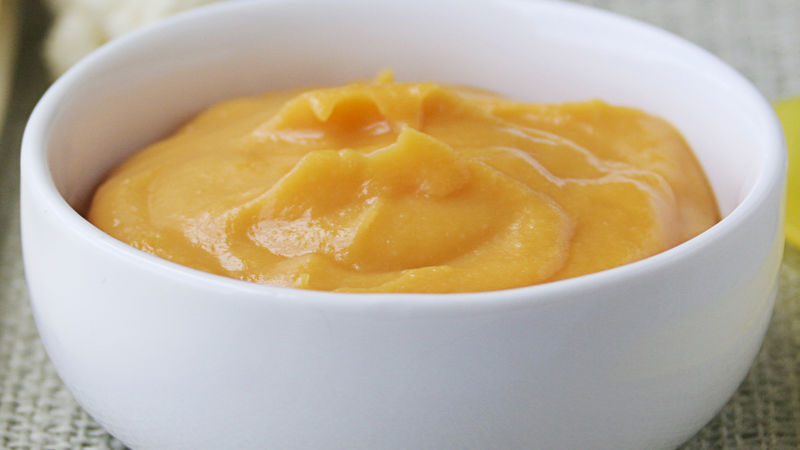
Source: Bettycrocker.com
Ingredients:
- 1 sweet potato
- 1 cup kale
- 1/2 cup cooked chickpeas
- 1/2 water
- ¼ teaspoon dill (optional)
Steam sweet potato for ten minutes and mix with kale. Steam two veggies together for 15 more minutes to get a mushy texture. Blend the vegetables with the cooked chickpeas.
If your kid is a picky eater, you can start with ½ cup kale and slowly increase it, so the kid gets used to the distinct taste. In this recipe, you can also replace kale with Swiss chard to get extra crunchiness.
#4 Whole Milk Yogurt, Oats & Blueberries for Healthy Growth
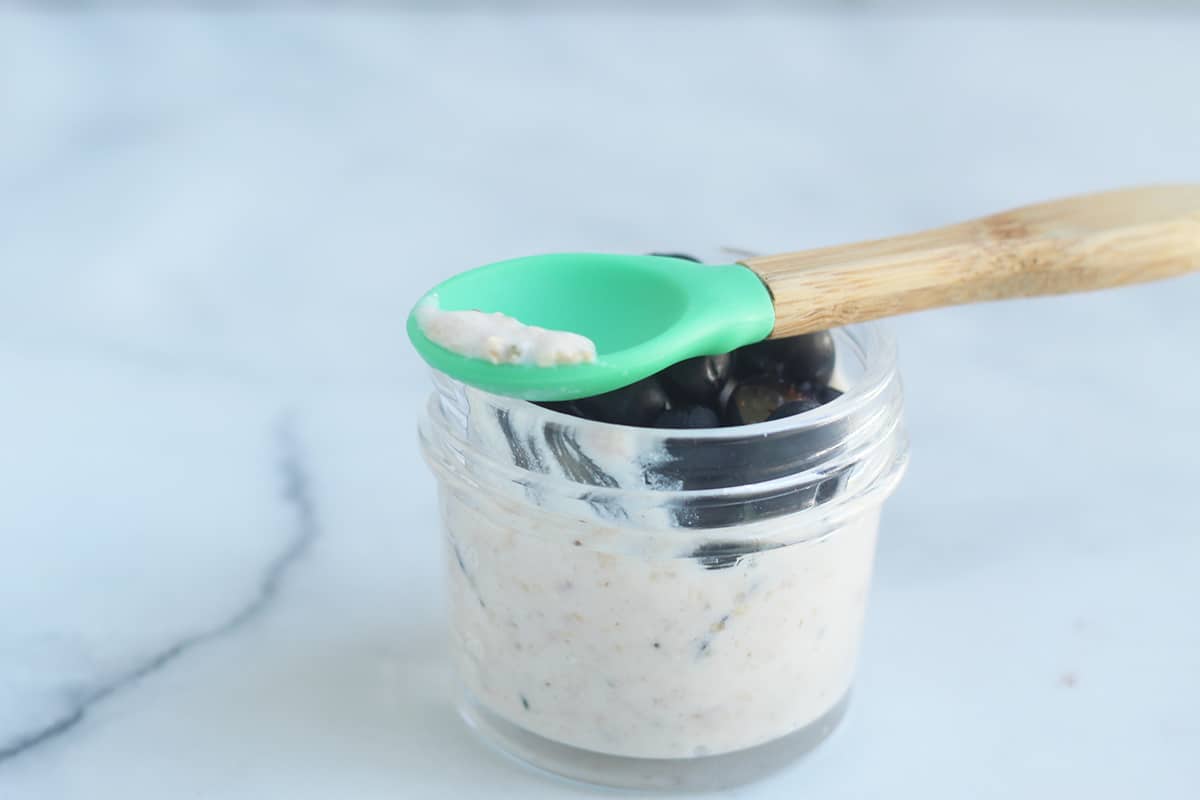
Source: Yummytoddlerfood.com
Ingredients:
- 1 cup yogurt
- 1/2 cup instant oats
- 1/2 blueberries (frozen or fresh)
Here is the best recipe that highlights stage 1 VS stage 2 baby food differences. In stage two you can use more than two ingredients to make delicious meals your baby won’t get enough of.
The night before, soak oats and blueberries in a jar with a lid. Pour everything in the blender the next day and process until you are satisfied with the texture.
Because plain yogurt has a neutral taste, you can easily mix it with a variety of other fruits, both frozen and fresh. Instead of blueberries, you can use raspberries, mango, ripe nectarines, kiwi, papaya, peaches – or any vet-approved fruit that your baby has taken a particular liking to!
#5 Humble Lentils have Excellent Health Benefits
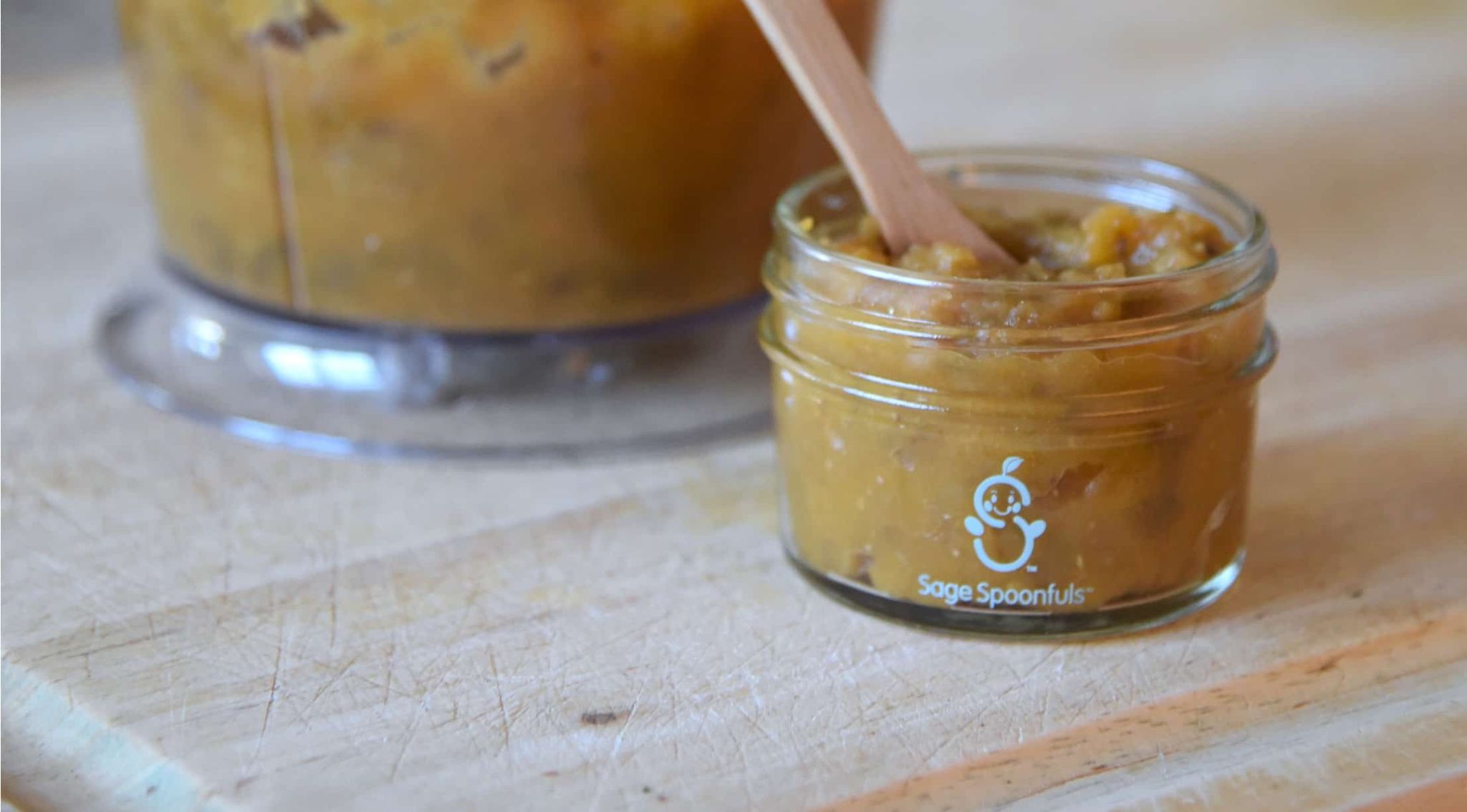
Ingredients:
- 1 sweet potato
- 1 pear
- 1/2 cup lentils
The combination of sweet potato and pear is sweet while the lentil gives it a pinch of savory flavor. Wash, peel, and chop potato and pear.
Cook lentils for 45 minutes. During that time steam the chopped sweet potato for 15 minutes. Blend the pear, cooked lentils, and steamed potato until you get desired consistency.
#6 Avocado and Banana Combo for a Wholesome Meal
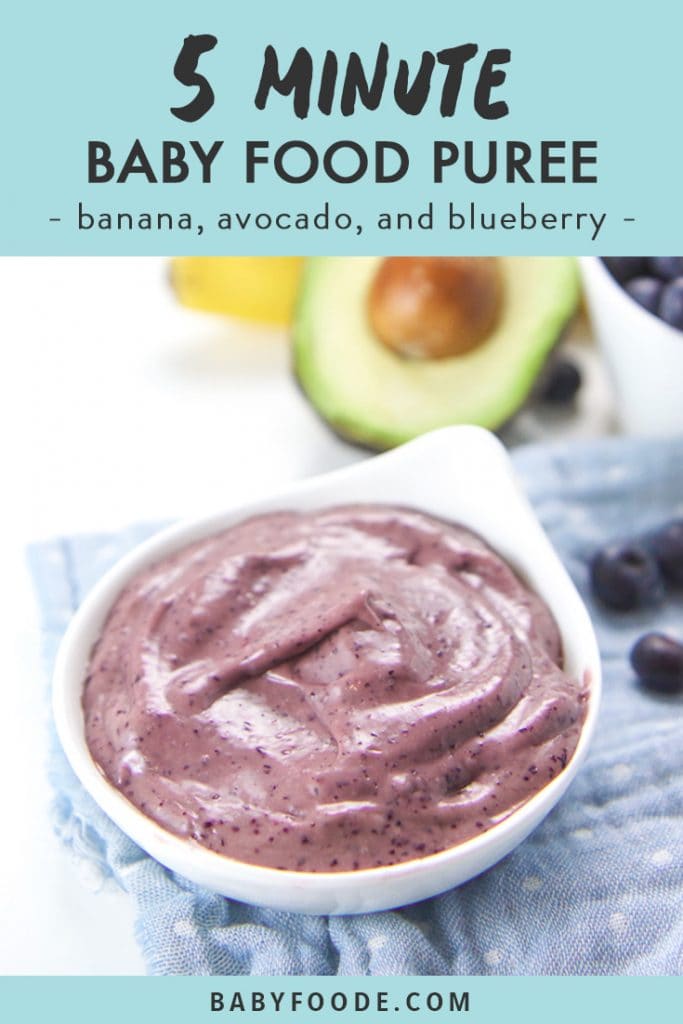
Source: Babyfoode.com
Ingredients:
- 1 banana
- 1/2 avocado
- 1 cup blueberries
Here is the quickest baby food meal on my list – None of the ingredients needs previous cooking and you can use all of them fresh or frozen.
Put them in a food processor or blender and blend to a puree consistency. If necessary, add a teaspoon of water or breastmilk to thin the texture.
Related: How to Make Breastmilk Fattier?
#7 Salmon is the Best Fish for Babies
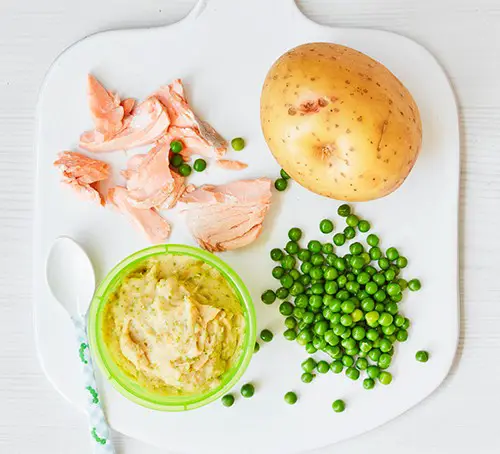
Source: Bbcgoodfood.com
Ingredients:
- 1 potato
- 1 salmon fillet
- 1/2 cup peas
- 1 teaspoon olive oil
Roast a potato wrapped in foil for one hour in the oven at 375 degrees Fahrenheit. Then, roast the salmon for ten minutes in the oven. In the meantime, cook peas in boiling water.
Once the potato is roasted, scoop the flesh with a spoon to blend with salmon and cooked peas. You can add a little bit of olive oil for taste!
Purees with Herbs and Spices
#1 Add Fennel to Aid Stomach Cramps
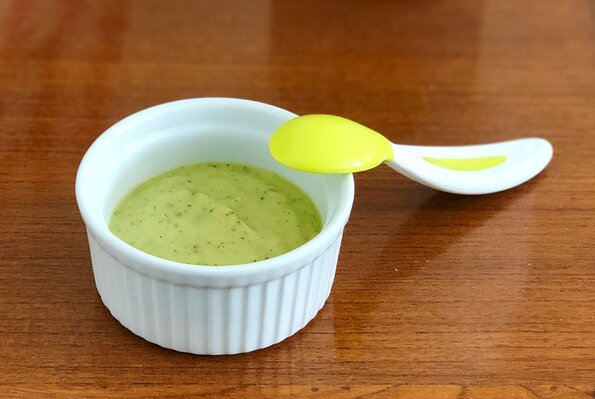
Ingredients:
- 1 small zucchini
- 1 fennel bulb
- 1 teaspoon of olive oil
- 1/2 cup water
Put chopped fennel and zucchini into a saucepan coated with olive oil. Cook for ten minutes on medium heat, and add water. Bring to a boil, reduce the heat to a minimum and let simmer for ten minutes. Wait until the mixture is cooled down to blend.
#2 Pair Spicy Ginger with Sweet Potato and Mango for a Balanced Taste
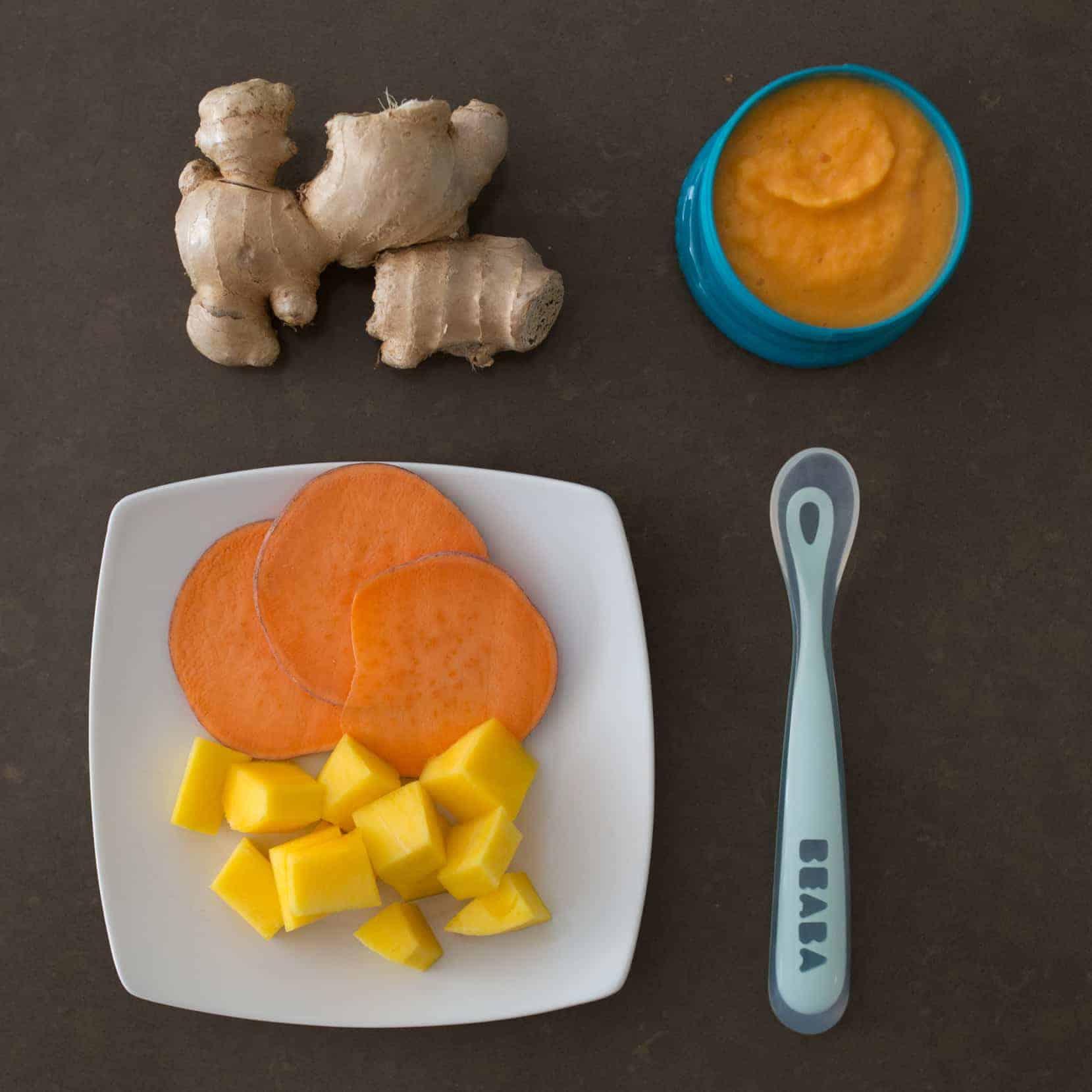
Ingredients:
- 1 sweet potato
- 1/2 mango
- 1/2 tablespoon grated ginger
- 1/4 cup water
Chop sweet potato into small cubes and simmer the pieces in the saucepan until they become soft. Mix with grated ginger and chopped mango. Use a blender to make a puree. Use water or breastmilk to thin the consistency if necessary.
#3 Orange is for Curry and Carrots
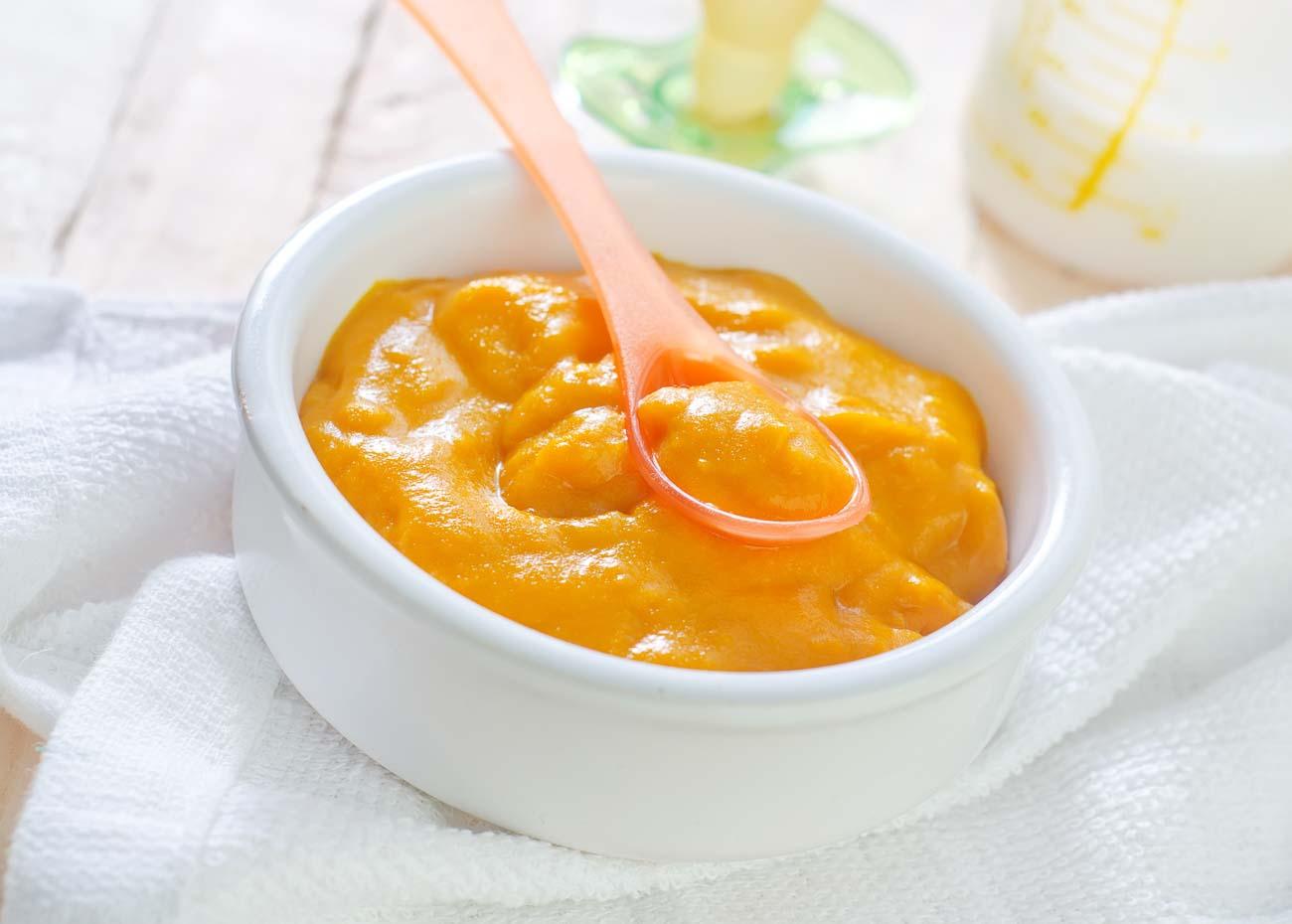
Source: Archanaskitchen.com
Ingredients:
- 1 apple
- 1/4 butternut squash
- 1 carrot
- 1 tablespoon curry powder
Chop apples, butternut squash and carrots and steam them for 15 to 20 minutes. When ingredients are cooled down, place them in a blender. Add curry powder and hit the process button. Once again, use breastmilk or water to help with thick undesired consistency!
#4 Peach and Vanilla Beans for a Sweet Lunch
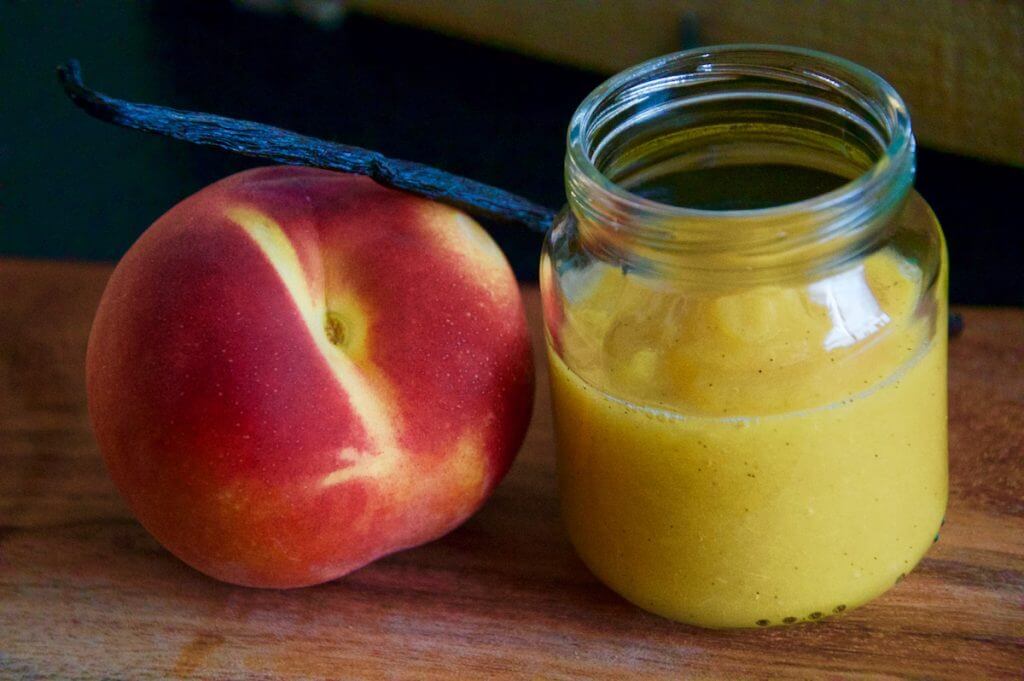
Ingredients:
- 2 peaches
- 1 vanilla bean
- 1/2 cup of water
This next one is pretty simple – you can always add more fruits and increase the number of vanilla beans. Apples will be a great addition to this recipe. Peel and chop peaches and put them in a saucepan with a vanilla bean and water.
Bring to a boil and simmer for 10 minutes. Pour the mixture into the blender. Once it cools down, blend until smooth!
#5 Mint and Peas for Tummy Relief
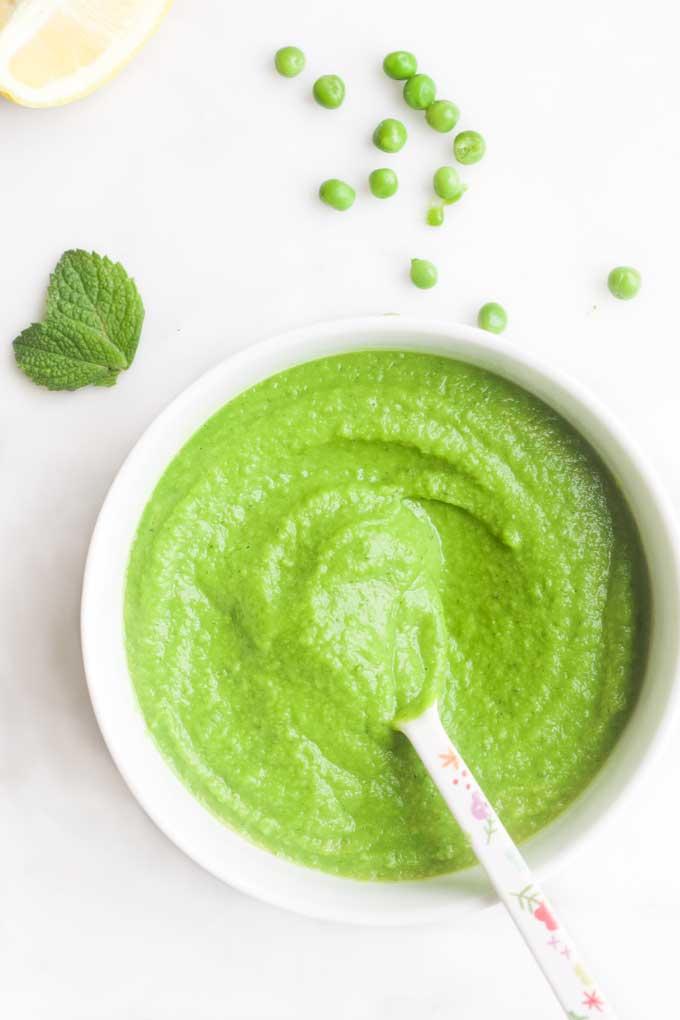
Source: Healthylittlefoodies.com
Ingredients:
- 2 cups peas
- 1 potato
- Fresh mint leaves
Cook peas and add chopped and peeled potato into boiling water for 20 minutes. Transfer the peas and potato into food processor then roughly chop mint leaves and add them with one tablespoon of water.
Process until you get a smooth texture. Add more water in which you’ve cooked the peas and potato to thin the texture for younger babies.
#6 Thyme Gives Unique Flavor to Roasted Veggies
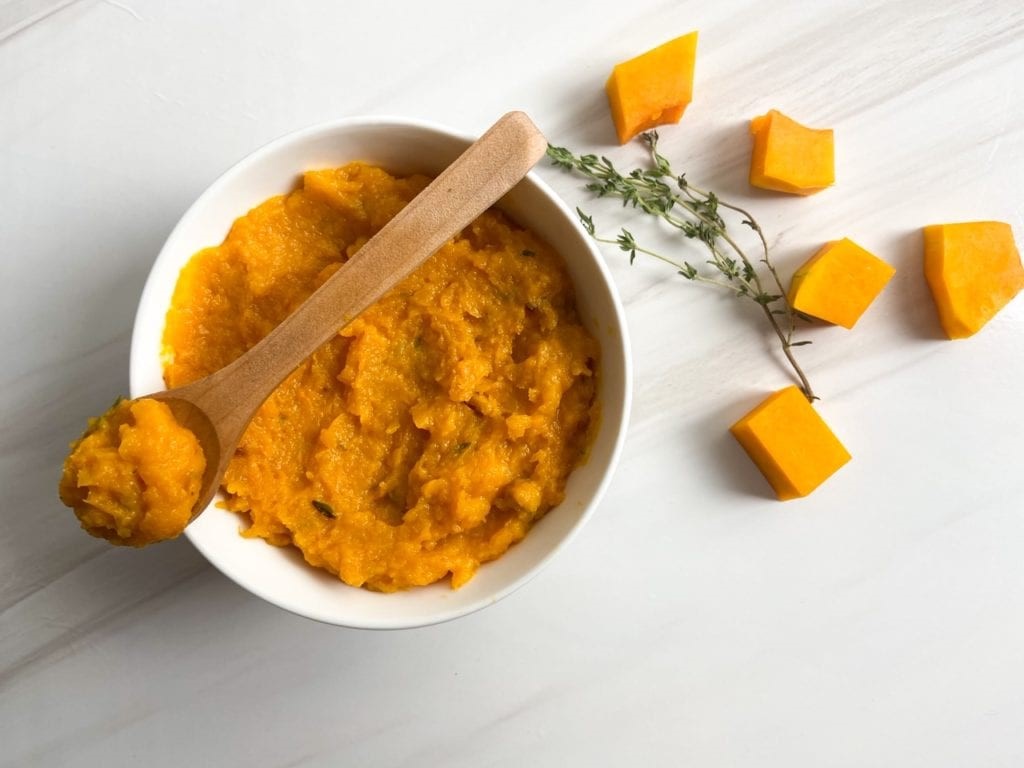
Source: Raisingveggielovers.com
Ingredients:
- 1/2 sweet potato
- 1/2 parsnip
- 1/2 carrot
- 1/4 cup water
- 1/2 teaspoon thyme
- 1/2 teaspoon olive oil
Peel and chop the vegetables. Place them on a roasting pan and coat with olive oil and thyme. Stir with your hands so each vegetable is coated. Bake at 375 degrees Fahrenheit for 45 minutes. Let the veggies cool down and blend them with a little bit of water.
#7 When your Blender Breaks Roast Pears with Rosemary
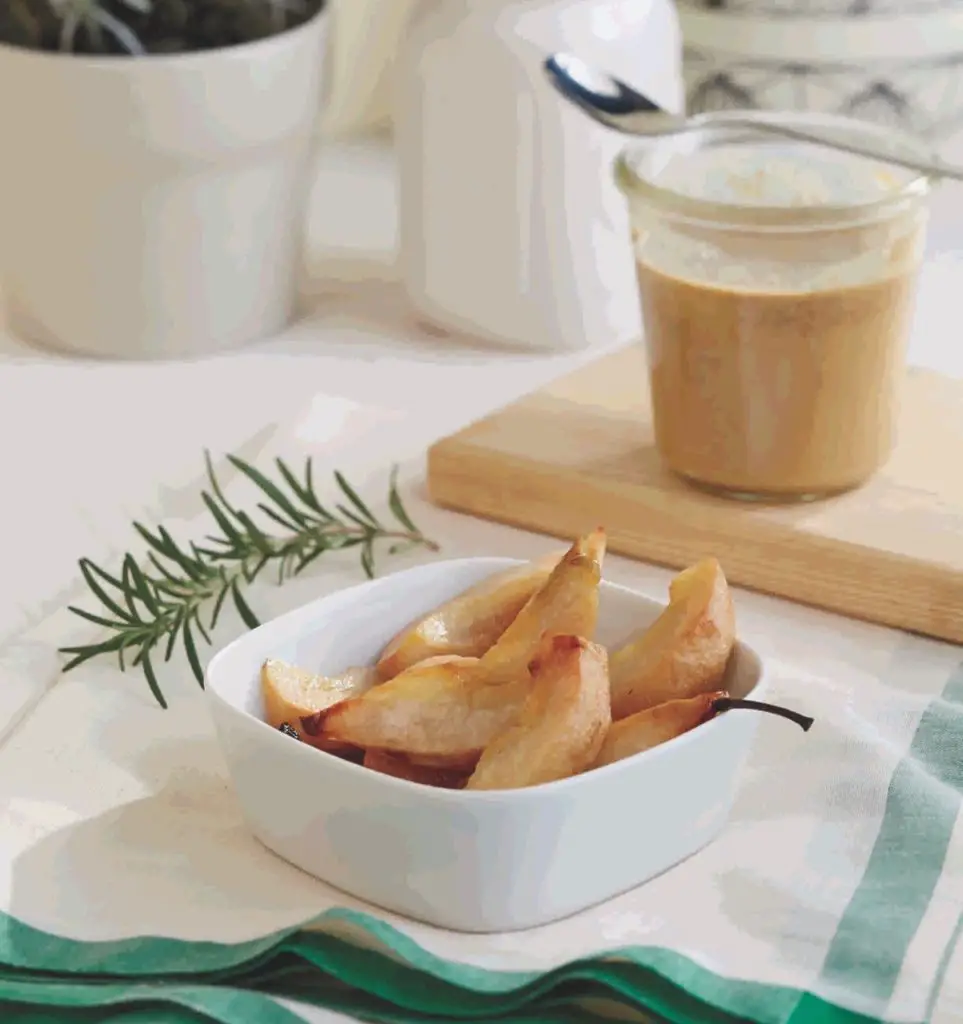
Ingredients:
- 2 pears
- 1 teaspoon olive oil
- 1 teaspoon almond butter
- 1/2 chopped fresh rosemary
Peel, chop, and put the pieces of pears into a roasting pan. Sprinkle them with rosemary, and place them into the oven at 375 degrees Fahrenheit.
Once the pears cool down, transfer them into a bowl and squish with a fork. Add almond butter and rosemary then stir well to serve!
FAQ’s
Here are some answers to some frequently asked questions that might help if you still find yourself struggling with when to start stage 2 foods and other related baby food topics.
1. What are the baby food ages?
According to the American Academy of Pediatrics, breastfeeding is the recommended way to feed the baby for the first four months. [3] The months after that is when baby phases start based on the baby’s age, as explained below:
- Stage 1: 4-6 months
- Stage 2: 6-8 months
- Stage 3: 9-12 months
- Stage 4: 12+ months
With each phase, the baby is older, can eat more ingredients and digest them easier. [4]
2. Why is stage 2 important?
Stage two contains food that isn’t as smoothly blended as one in stage 1. [5] This is to improve the baby’s ability to chew and swallow as they start the teething phase. Gradually, the baby digests solids easier.
3. How do I ensure my baby is getting the nutrients they need?
Come up with a diverse nutrition plan, and pick ingredients rich in essential nutrients such as proteins, minerals, vitamins, complex carbohydrates, healthy fats, iron, etc. Mix two or three different ingredients into every meal to promote a balanced and nutritional diet.
4. When should my baby start stage 3?
Once you know what age is stage 2 baby food, it gets easier to decide when to start with stage 3 foods. You can slowly introduce stage 3 ingredients once the baby passes nine months.
5. How closely do I need to follow the baby food stages?
The stages are there to help parents solve issues with introducing new foods to their children. You can follow them to introduce new foods and textures safely. Talk with your pediatrician if you want to introduce other foods sooner than stage 2 includes them.
Conclusion
Certain clues are especially helpful in helping you decide when to start stage 2 baby food. The simplest is to observe how your baby reacts as you initially attempt to introduce a certain ingredient, say spices, to the baby.
A happy baby will display signs of wanting more of said food. Hopefully, my list of recipes in this stage will help with your ideas in keeping your baby full-fed and happy!
Did you enjoy the list? Which recipe is your favorite? My daughter’s favorite is the puree made with banana, blueberry, and avocado; she couldn’t get enough of it!
If you have more recipes to share, feel free to share them with me @babyjourney0183 on Pinterest!
—
